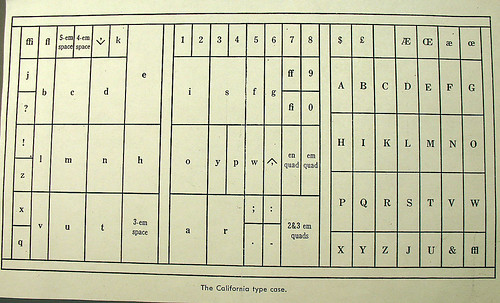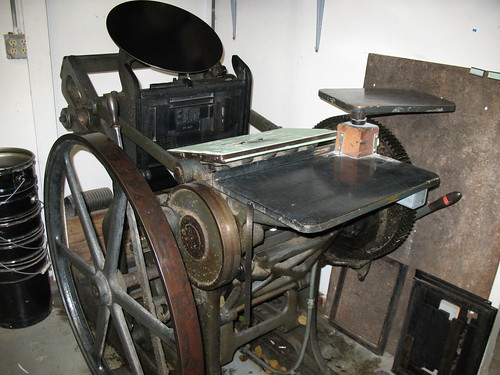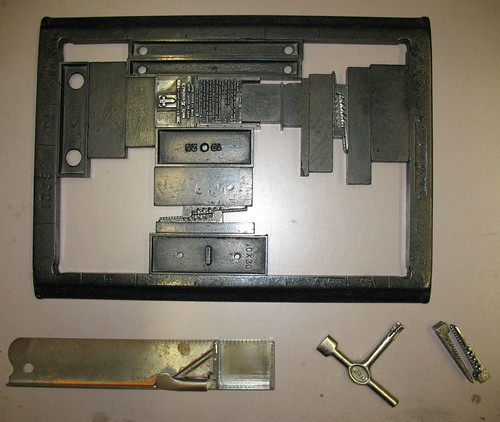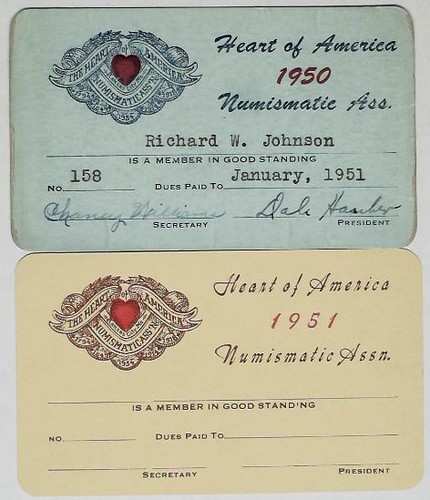
PREV ARTICLE
NEXT ARTICLE
FULL ISSUE
PREV FULL ISSUE
JEFF REICHENBERGER ON PRINTING TECHNOLOGY
Jeff Reichenberger submitted these thoughts on printing technology inspired by Dick Johnson. He also introduces a vocabulary word that David Klinger explains further in the following item.
-Editor
Just a few comments about the type case used in the Thames and Field article and thanks to Dick Johnson for his reminisce. Dick observed that the Thames and Field case is upside down, which is true. Also, perhaps it is an older case, but the type cases I am familiar with (in fact, I still use them regularly) are longer by 1/3. The missing section would hold the capital letters. As you can see, larger compartments do hold the letters used most often.

Below is one of the cases I currently use.

I have letterpress equipment and two type cases (two fonts) that I use for a certain recurring job and various obscure jobs in my print shop. In addition, I use the Platen Press for perforating, scoring, and die cutting applications. For printing - back in the day - the idea was for the printer to 'kiss' the paper with the inked type just enough to make a clear and crisp impression without making a 'bite' in the paper - that is, too hard of an impression so the back of the sheet looks embossed. This was particularly important in book printing where printed pages back each other up. Ironically, in recent times, I have printed invitations where the customer was insistent that there be a 'bite' in the paper to add 'old fashioned authenticity' to her project! (There was no reason for me to explain that the age of the machine, worn gears, bushings, cams, and joints made it impossible for anything but a substantial 'bite'.) Living in the stone-age has its advantages! Below is a photo of the Chandler and Price 15" platen press in my shop. Likely built around 1910.

This photo shows some printers tools. The steel frame is called a 'chase'. The type is locked into the chase using wood and steel blocks known as 'furniture'. You can see the type locked in with a 'cut' of a cross. A cut is simply an engraved device cut into a larger piece of lead or wood, which is type height and will print along with the type copy. The items at the bottom are -left to right- a composing stick. This is where you compose your words (upside down of course). The T-handle wrench is what you use to tighten everything into the chase. Finally, the device at the bottom right -two steel wedges with teeth- what the T-handle forces apart to tighten the whole thing - and what is my only real link to justify this rambling in a numismatic e-magazine - is known as...drum roll please...a QUOIN!!

I am in complete agreement with Dick's assessment: "Anyone who has set type by hand, locked it in a frame, put the frame in a press, and printed a first impression will know the thrill of seeing your handwork in print. It set me up for a lifetime as a lover of the printed word and related fields of writing and book collecting." For me, a bibliophilic tendency is a natural extension of my profession. Printing has become rather fast-paced and techno-heavy these days. I often feel like not much more than a copy jockey, which is why I really enjoy running the letterpress from time to time. It regenerates me and makes me feel like a real printer! Dick Johnson adds: What a delight to view these photos. It brings back a rush of fond memories. I look back on those few years I was a printer as some of my happiest! Jeff's Chandler & Price press looks exactly like the two I had, but mine were made in 1880 and 1910. I didn't save many of the things I printed, but I do have some of the membership cards. Here are two cards of the Heart of America Numismatic Association. I didn't abbreviate "Association" properly in 1950, but corrected it in 1951. Members found that hilarious.

To read the earlier E-Sylum article, see:
DICK JOHNSON REMINISCES: TYPE DRAWERS AND PRINTING
(www.coinbooks.org/esylum_v15n03a07.html)
The Numismatic Bibliomania Society is a non-profit organization promoting numismatic literature. See our web site at coinbooks.org. To submit items for publication in The E-Sylum, write to the Editor at this address: whomren@gmail.com To subscribe go to: https://my.binhost.com/lists/listinfo/esylum All Rights Reserved. NBS Home Page Contact the NBS webmaster 
|